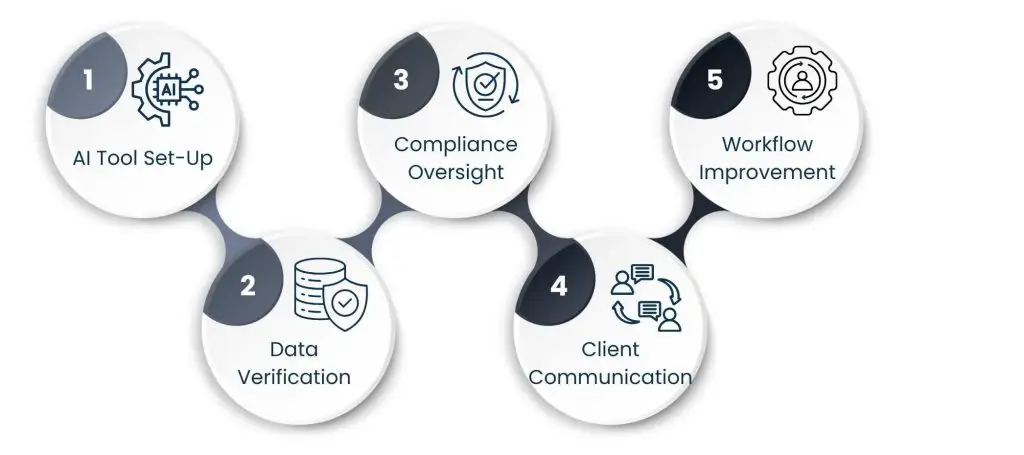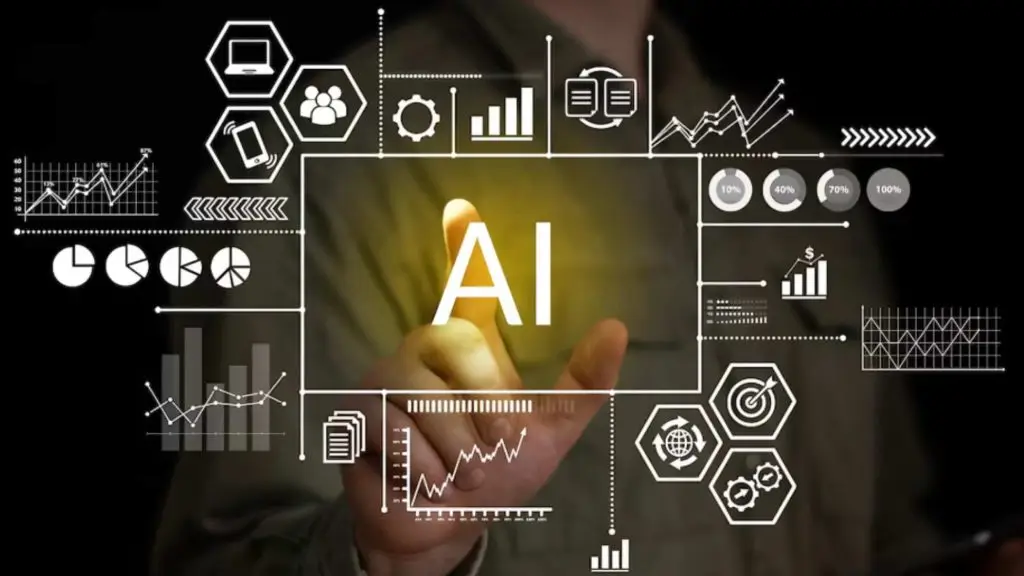Introduction
Accounting and AI integration is emerging to revolutionize financial management. Technology is speeding up how accountants work, from automated bookkeeping to AI-driven forecasting. But this development begs the question: Can AI do the work of an accountant? The response is not as straightforward as a yes or no. As much as AI automates processes, it doesn’t have the context and vision required to succeed in financial services. That’s where virtual assistants step in to bridge the gap between automation and human insight.
We are now in a high-tech accounting environment where virtual assistants are a necessity. They oversee tools such as QuickBooks, Zoho Books, and Xero and keep accurate data and efficient workflows in play. Unlike AI, VAs do nuanced work, say, interpreting notes from a client, chasing documents, or analyzing flagged transactions, which involves judgment and communication. They are intermediaries between human intuition and automated systems.
This fusion of accounting and AI creates a smarter, quicker, and cheaper way. This isn’t about replacing accountants; it’s about enhancing their capabilities through AI and VA integration, elevating the skills of bookkeepers by integrating API and turning them into a force of financial nature that can be scaled not just with technology, but with an extra heart. They are back-end players that make AI more functional and more actionable, and demonstrate that tech doesn’t eliminate the role of people, it just changes what that role looks like.
Evolving Accounting And AI: Beyond Spreadsheets to Smart Systems
AI has reshaped the finance industry, from manual processes to automation. The path started with rudimentary tools, spreadsheets, ledgers, and calculators. Now, we’re seeing a movement towards smart accounting ecosystems that merge AI-based algorithms with human assistance.

Here’s how accounting and AI have evolved at various stages:
Stage 1: Routine Automation:
Automate tasks including invoice coding, data entry & reconciliation. This work, which had been done by hand, was partially automated by early tools, reducing the time needed to perform it and the frequency of mistakes. It had cut costs and freed accountants’ time for more high-value work.
Stage 2: Intelligent help:
AI now powers fraud detection, predictive modeling, real-time cash flow tracking, and smart forecasting. Algorithms are taught by sifting through vast amounts of financial data for patterns and using those algorithms to determine what’s out of place and where it’s headed next. This newest capability is now allowing finance teams to be more strategic and proactive.
Stage 3: Generative AI:
Use of generative AI for report generation, auto-fill tax forms, and driving strategic financial decisions. These instruments are starting to support natural language queries, which will enable accountants to receive automated summaries and compliance-ready reports. They’re also enhancing communication with clients through AI-created emails and feedback.
Even as AI supplies efficiency and speed, it is not without its limits. And that’s where accounting virtual assistants come in to fill in the gaps:
- Oversight: VA oversight of AI-generated outputs for errors or anomalies. They confirm data inbound to clients or stakeholders so that final reports hit the quality mark. And the human perspective they introduce adds the necessary check that AI systems by themselves cannot deliver.
- Personalization: Human substitutes for AI lack knowledge of client preferences, tone, and situational relevance. VAs anchor the other end of the bridge. They tailor communication and reporting to client history and expectations, delivering a bespoke service. This is what keeps the customer happy and satisfied.
- Flexibility: Virtual assistants are flexible and able to perform unstructured tasks that are outside the realm of algorithmic rules. Whether it’s a slight finessing of a last-minute submission, ensuring no supporting documentation was accidentally left, or altering your compliance on the fly, VAs are still on hand. Their responses contribute to uninterrupted workflows, even in the case of emergencies.
That’s the potential future of accounting and AI in this dynamic partnership. AI handles bulk data processing and analytics first; VAs second, provide the personalization, accuracy, and relevance, in turn making every number count.
Here’s the thing: companies that invest in this hybrid model, where AI in finance and accounting supplements trained virtual assistants, get the best of both worlds: scalable automation alongside human intuition.
Can accountants be replaced by AI? No. But they can transform the nature of the role they currently play, particularly if full-service personal assistants are offering end-to-end automation aligned with the business goal.
As an entire system of record, it allows for rapid reporting, informed decision-making, and timely insights that keep companies one step ahead in today’s accelerating world of data.
How Virtual Assistants Enhance AI And Accounting Workflows
In the age of automation, virtual assistants are not exactly that; they’re not merely task managers, but strategic partners. With AI already revolutionizing accounting, AI accounting virtual assistant services have evolved to deliver more advanced help to finance professionals, becoming an essential part of AI-driven accounting workflows.

Here’s how virtual assistants contribute:
- AI Tool Set-Up: VAs integrate and manage AI-driven accounting applications like QuickBooks or Xero, and customize the system for the business.
- Data Verification: They check for variance in system-generated reports on a regular basis and also check for accuracy on transactional entries to ensure clean data.
- Compliance Oversight: VAs can review and flag AI-generated financial documents for possible compliance problems AI might overlook, like regional tax differences or incomplete records.
- Client Communication: Virtual assistants handle crucial communication – they send requests for payments, collect documents, respond to client questions, and set dates for filing taxes.
- Workflow Improvement: Accounting is made easy with VAs by syncing third-party apps, storing digital files, and keeping an audit trail.
Their task is crucial in controlling the balance of human AI. AI can process data and automate work processes, but VAs provide context, quality control, and variation so that output is fast but also reliable.
Be it reconciling inconsistencies, updating client data, or reviewing AI insights in advance of reports going out, VAs serve as the accountability layer that AI is missing. They are a shortcut, enabling accounting teams to scale efficiently with less risk and higher client satisfaction.
In other words, virtual assistants, here, are the workhorses of AI and accounting. Artificial intelligence in accounting and finance, paired alongside trained VAs, ensures every digital process is rooted in real-world comprehension. The two are thus a force multiplier, enabling smarter workflows, consistent results, and a trust in the landscape that automation alone can never provide.
AI and accounting- Advantages of Integration
Put a virtual assistant to work in AI and accounting-related workflows together, and you’ll probably have a powerful hybrid that amplifies productivity and accuracy. This is particularly important in finance, which is high-stakes and compliance-dependent.

The following are some of the best advantages of the accounting and AI combo:
1. Greater Precision:
AI systems crunch vast amounts of data, but virtual assistants check that output, detecting aberrations that algorithms might miss or downplay. This two-tiered check makes it relatively hard for financial statements to be manipulated.
2. Massive Time Savings:
As AI conducts repetitive calculations, VAs interact with clients and communicate with your team – save hours every week!
3. Real-Time Reporting Simplified:
AI arms companies with real-time dashboards and predictive reports, and virtual assistants help ensure that intelligence is properly stored, vetted, and ready for reporting by decision-makers.
4. Better Customer Experience:
Virtual personal assistants are tasked with handling services that are centered more around humans answering customer inquiries, setting appointments, or preparing summary reports of a personalized nature. It’s the kind of empathy and adaptability no AI will ever provide.
5. Cost savings:
Companies can also trim overhead by outsourcing work to VAs, as opposed to widening the in-house staff. AI and accounting together reduce overhead by automating large volumes of work.
6. Scalability:
With higher flexibility, you can support a continuously increasing number of clients, transactions, and data, and maintain a level of quality.
7. Human Oversight to Check for Compliance:
Like VAs monitor compliance by seeing if changes were made in time in tax rules, raising flags if all entries were made, and if the right documents accompany the submission. This kind of human double-checking is vital in heavily regulated areas such as finance.
8. Greater Productivity:
When AI is teamed with virtual assistants, your in-house staff members can concentrate more on higher-value tasks such as strategic planning and customer contact points, in addition to growth opportunities.
9. Smarter Decisions:
AI provides insights, and VAs contextualize them, turning data into answers. This partnership enables finance teams to be data-driven.
The combination of AI and accounting is not only an issue of cost or efficiency; it is a matter of creating a smarter, more resilient finance function. From better financial oversight to faster month-end closes to improved client satisfaction, there are measurable benefits at every point in the business life cycle.
Also Read: Best AI Assistant for Managing Tasks
Accounting and AI- Role Transformation Of Accountant
The future of accounting and AI is not about replacing; it’s about transforming. With AI embedded in finance more deeply, its power will amplify in real-time trading and other areas.
Predictive financial modeling, automation of tax, anomaly detection, and visualization of data. But those advances aren’t going to replace the need for humans. Instead, they will generate the need for more (and deeper) support roles that can mediate the processing, interpretation, and contextualization of AI deliverables.
As AI develops, virtual assistants (VAs) for accounting will specialize even further and will be more closely tied to the strategic aspects of accounting processes.

VAs will be trained to:
- Learn how to set up and operate AI-fueled accounting systems.
- Check data accuracy and understand flagged exceptions.
- Maintain compliance by following regulatory changes and updating reports to reflect them.
- Assist accountants in generating AI statements in client-ready format using AI data outputs.
It is this hybrid model of AI and accounting with human oversight that is most present for the future. It strips out mind-numbing manual labor but keeps the same human flexibility, decision-making, and personalization that customers depend on.
But in the broader debate of AI versus human accountants, the picture is more cooperative than competitive. AI scales capacity, and virtual assistants boost reliability. Combined, they help accounting professionals do more with less, smarter, quicker, and more confidently.
It’s not a case of this or that, AI or humans, that will make the future of accounting. Virtual assistants were going to be a big part of that future, one where the promise of automation is realized without stripping away quality or context or trust.
Conclusion
As new accounting technology emerges, the AI and accounting combination has become more important than ever. Although AI tools improve speed, efficiency, and accuracy, they lack the ability, discernment, and communication skills necessary for financial relationships. And that’s where virtual assistants come in to fill in those very critical blanks that AI isn’t able to fill.
Whether setting up accounting systems, maintaining compliance, or managing subtle client conversations, virtual assistants will ensure AI’s data results in useful and consistent actions. They go beyond just facilitating accountants to support and enhance them, enabling them to work faster, smarter, and more confidently.
The future of accounting and AI combines technology with human support. Hiring trained virtual assistants ensures that your people are not only versed in automation but also in the nuances of finance. This equilibrium fosters more intelligent decision-making, efficient processes, and sustainable growth.
So, is AI replacing accountants? Certainly not without a virtual assistant holding its hand.
Allow Tasks Expert to be there for your evolution, by combining smart accounting and AI.
About Us
Tasks Expert offers top-tier virtual assistant services from highly skilled professionals based in India. Our VAs handle a wide range of tasks, from part time personal assistant to specialized services like remote it support services, professional bookkeeping service etc. Furthermore, it helps businesses worldwide streamline operations and boost productivity.
Ready to elevate your business? Book a Call and let Tasks Expert take care of the rest.









